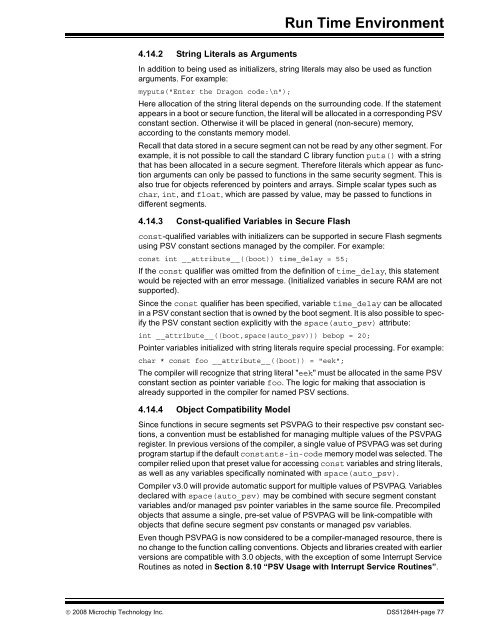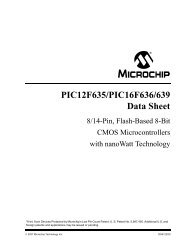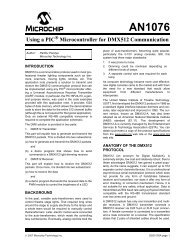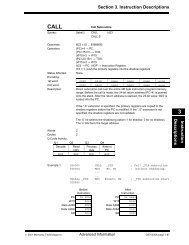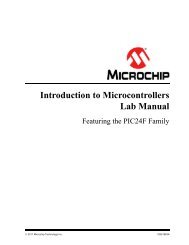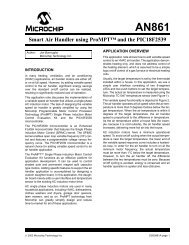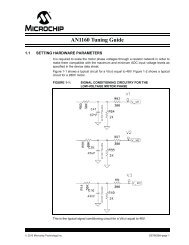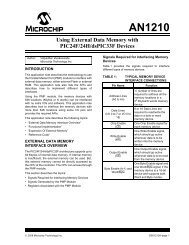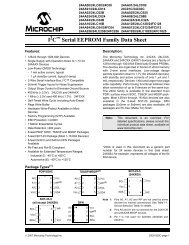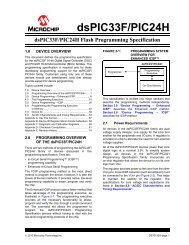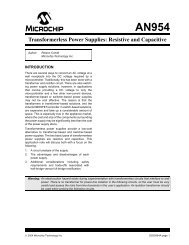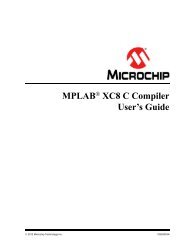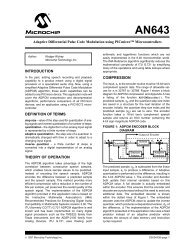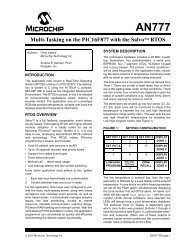MPLAB C Compiler for PIC24 MCUs and dsPIC DSCs ... - Microchip
MPLAB C Compiler for PIC24 MCUs and dsPIC DSCs ... - Microchip
MPLAB C Compiler for PIC24 MCUs and dsPIC DSCs ... - Microchip
Create successful ePaper yourself
Turn your PDF publications into a flip-book with our unique Google optimized e-Paper software.
4.14.2 String Literals as Arguments<br />
Run Time Environment<br />
In addition to being used as initializers, string literals may also be used as function<br />
arguments. For example:<br />
myputs("Enter the Dragon code:\n");<br />
Here allocation of the string literal depends on the surrounding code. If the statement<br />
appears in a boot or secure function, the literal will be allocated in a corresponding PSV<br />
constant section. Otherwise it will be placed in general (non-secure) memory,<br />
according to the constants memory model.<br />
Recall that data stored in a secure segment can not be read by any other segment. For<br />
example, it is not possible to call the st<strong>and</strong>ard C library function puts() with a string<br />
that has been allocated in a secure segment. There<strong>for</strong>e literals which appear as function<br />
arguments can only be passed to functions in the same security segment. This is<br />
also true <strong>for</strong> objects referenced by pointers <strong>and</strong> arrays. Simple scalar types such as<br />
char, int, <strong>and</strong> float, which are passed by value, may be passed to functions in<br />
different segments.<br />
4.14.3 Const-qualified Variables in Secure Flash<br />
const-qualified variables with initializers can be supported in secure Flash segments<br />
using PSV constant sections managed by the compiler. For example:<br />
const int __attribute__((boot)) time_delay = 55;<br />
If the const qualifier was omitted from the definition of time_delay, this statement<br />
would be rejected with an error message. (Initialized variables in secure RAM are not<br />
supported).<br />
Since the const qualifier has been specified, variable time_delay can be allocated<br />
in a PSV constant section that is owned by the boot segment. It is also possible to specify<br />
the PSV constant section explicitly with the space(auto_psv) attribute:<br />
int __attribute__((boot,space(auto_psv))) bebop = 20;<br />
Pointer variables initialized with string literals require special processing. For example:<br />
char * const foo __attribute__((boot)) = "eek";<br />
The compiler will recognize that string literal "eek" must be allocated in the same PSV<br />
constant section as pointer variable foo. The logic <strong>for</strong> making that association is<br />
already supported in the compiler <strong>for</strong> named PSV sections.<br />
4.14.4 Object Compatibility Model<br />
Since functions in secure segments set PSVPAG to their respective psv constant sections,<br />
a convention must be established <strong>for</strong> managing multiple values of the PSVPAG<br />
register. In previous versions of the compiler, a single value of PSVPAG was set during<br />
program startup if the default constants-in-code memory model was selected. The<br />
compiler relied upon that preset value <strong>for</strong> accessing const variables <strong>and</strong> string literals,<br />
as well as any variables specifically nominated with space(auto_psv).<br />
<strong>Compiler</strong> v3.0 will provide automatic support <strong>for</strong> multiple values of PSVPAG. Variables<br />
declared with space(auto_psv) may be combined with secure segment constant<br />
variables <strong>and</strong>/or managed psv pointer variables in the same source file. Precompiled<br />
objects that assume a single, pre-set value of PSVPAG will be link-compatible with<br />
objects that define secure segment psv constants or managed psv variables.<br />
Even though PSVPAG is now considered to be a compiler-managed resource, there is<br />
no change to the function calling conventions. Objects <strong>and</strong> libraries created with earlier<br />
versions are compatible with 3.0 objects, with the exception of some Interrupt Service<br />
Routines as noted in Section 8.10 “PSV Usage with Interrupt Service Routines”.<br />
© 2008 <strong>Microchip</strong> Technology Inc. DS51284H-page 77


